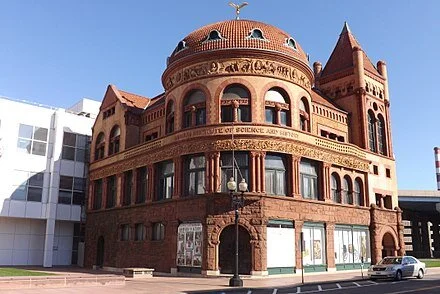
Make 'em smile!
The Barnum Museum, in Bridgeport, which has loads of stuff about the impresario’s career and about Bridgeport.
“The noblest art is that of making others happy.’’
— P.T. Barnum (1810-1891), the entertainment mogul best known as the creator of the the modern American circus, in Struggles and Triumphs. A native of Bethel, Conn., he is most associated with Bridgeport, the once world-famous industrial powerhouse that was his base of operations and where he served as mayor in 1975-1876.
The phrase "There's a sucker born every minute" is a phrase closely associated with Mr. Barnum but there’s no evidence he actually said it.
1866 newspaper advertisement for Barnum's American Museum, on Ann Street in Manhattan.
Downtown Bethel in 1914.
As X-Mass nears, atheists acting up in Bethel, Conn.
P.T. Barnum Fountain and Square, in Bethal, Conn., circa 1914.
Christmas is approaching, not the discordant commercial enterprise we see all around us at this time of year, but the real Christmas – a celebration of the birth of Jesus Christ, the sovereign lord of the Christian heart. Atheists, those who do not believe in God or religion, have been in the habit of seizing the occasion to celebrate an obverse Christmas by spreading ashes on the joys of the Christian heart and obliterating the season through the application of free and equal graffiti.
In Bethel, Conn., atheists are especially interested this year in ridding the town’s P. T. Barnum Square of its nativity scene. For the benefit of those atheists who do not always follow the niceties of Christianity, it should be noted that the bones of Barnum’s family are buried in the quiet graveyard abutting the Congressional church not a stone’s throw from Barnum Square.
Barnum himself subscribed to the Universalist Church. He told New York Sun reporter in an 1864 interview, “I believe there is a great Creator, infinite in his attributes of wisdom, power, and mercy: that His name is Love. I believe He is a God of all justice, and that He will chasten every person whom He ever created sufficiently to reform him, in this world, or some other." Barnum was not an atheist.
For two years, Barnum edited his own newspaper in Danbury, the Herald of Freedom, and combatted what he viewed as sectarian attempts to bring about a union of church and state.
Barnum’s views on a national or state church mirrored those of the Founders and the First Amendment to the U. S. Constitution, which states, “Congress shall make no law respecting an establishment of religion or prohibiting the free exercise thereof, or abridging the freedom of speech or of the press, or the right of the people peaceably to assemble and to petition the government for a redress of grievances.”
It should be noted that the strictures of the First Amendment are satisfied when the law making body of the federal government refrains from making laws that a) establish a state supported church, and b) prohibit the free exercise of religion. The two clauses are joined together in the amendment. And in matters of constitutional interpretation, courts especially should be mindful that what the Constitution has joined together no judge should “therefore put asunder.” Both clauses should be equally weighed in every judicial finding on the great question of state-religious relations.
Indeed, the clauses “inform” each other: A judicial ruling concerning the meaning of the “establishment clause” cannot, under a just interpretation, effectively repeal the “free exercise” clause. And the balance established between the two clauses is best achieved when the law making body refrains from producing enactments affecting either the establishment of a state church or the free exercise of religion.
It is very clear that the amendment opens a wide door to religious liberty, even as the same amendment opens a wide door of liberty to a free press and the expression of political opinion. Church and state are effectively “separated,” in the true Jeffersonian sense, when the state refrains from making laws or edicts that prohibit the free exercise of religion or constitutionally abuse its secular power for the purpose of establishing a national or state church.
The town’s name, incidentally, has a biblical meaning. Bethel is called “the house of God” because it was in Bethel where “God talked with him” (Hosea 12:4 Hosea 12:5 ), after which Jacob built an altar, calling the place El-beth-el. In times of trouble the Jewish people traveled to Bethel to take council with God. The Ark of the Covenant was kept there for a long time under the care of Phineas, the grandson of Aaron (20:26-28 ). Barnum’s first name, also incidentally, is Phineas.
It is not possible for atheists to drive Christians back to the catacombs, where once they gathered to worship the lord of their hearts far from the murderous glances of pagan emperors. There is no national church in the United States. Under the aegis of the Constitution, the Congregational Church of our forefathers -- in essence a national church -- has been effectively disestablished. Connecticut disestablished the Congregational church in 1818. We are left with a potpourri of religious establishments. Barnum himself drifted from Congregationalism to the Universalist Church.
On a Christmas morning, bells sound from Catholic spires, wounding the ears no doubt of Scrooge-like atheists shouting their humbug in the public square. Firm in their unbelief, we must not suppose atheist demands can be easily accommodated.
But really, the sectarian and constitutional difficulties in “the House of God” will be settled when the good people of Bethel make a distinction between a religious establishment, governed by the First Amendment, and a self-professed irreligious establishment, atheism, that seeks to cover religious displays with atheist graffiti.
One must suppose that Barnum, an avid trickster like his father, might have provided room in his circus for this amusing display of historical revisionism.
Don Pesci is a Vernon, Conn.-based columnist.




